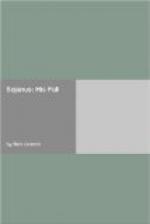“Volpone” was laid as to scene in Venice. Whether because of the success of “Eastward Hoe” or for other reasons, the other three comedies declare in the words of the prologue to “The Alchemist”:
“Our scene is London, ’cause we would make known No country’s mirth is better than our own.”
Indeed Jonson went further when he came to revise his plays for collected publication in his folio of 1616, he transferred the scene of “Every Man in His Humou r” from Florence to London also, converting Signior Lorenzo di Pazzi to Old Kno’well, Prospero to Master Welborn, and Hesperida to Dame Kitely “dwelling i’ the Old Jewry.”
In his comedies of London life, despite his trend towards caricature, Jonson has shown himself a genuine realist, drawing from the life about him with an experience and insight rare in any generation. A happy comparison has been suggested between Ben Jonson and Charles Dickens. Both were men of the people, lowly born and hardly bred. Each knew the London of his time as few men knew it; and each represented it intimately and in elaborate detail. Both men were at heart moralists, seeking the truth by the exaggerated methods of humour and caricature; perverse, even wrong-headed at times, but possessed of a true pathos and largeness of heart, and when all has been said—though the Elizabethan ran to satire, the Victorian to sentimentality—leaving the world better for the art that they practised in it.
In 1616, the year of the death of Shakespeare, Jonson collected his plays, his poetry, and his masques for publication in a collective edition. This was an unusual thing at the time and had been attempted by no dramatist before Jonson. This volume published, in a carefully revised text, all the plays thus far mentioned, excepting “The Case is Altered,” which Jonson did not acknowledge, “Bartholomew Fair,” and “The Devil is an Ass,” which was written too late. It included likewise a book of some hundred and thirty odd ‘Epigrams’, in which form of brief and pungent writing Jonson was an acknowledged master; “The Forest,” a smaller collection of lyric and occasional verse and some ten ‘Masques’ and ‘Entertainments’. In this same year Jonson was made poet laureate with a pension of one hundred marks a year. This, with his fees and returns from several noblemen, and




